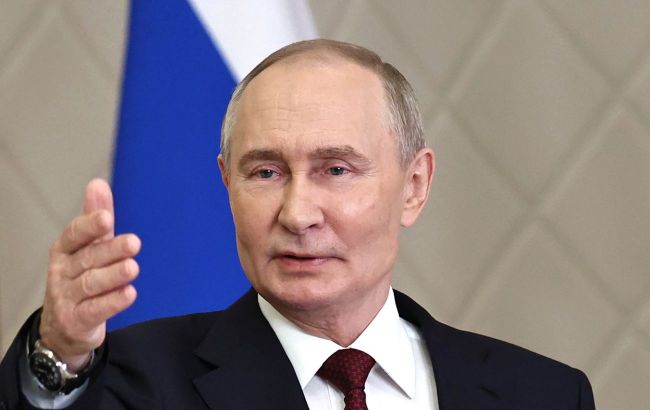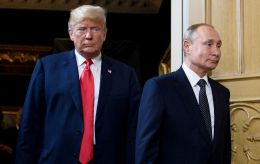Russia refuses to change its goals and to blame Ukraine for refusing to end war - ISW
 Photo: Russian leader Vladimir Putin (Getty Images)
Photo: Russian leader Vladimir Putin (Getty Images)
The Kremlin is trying to use the summit in Alaska not to conduct meaningful peace negotiations, but to drive a wedge between the United States and Europe, the American Institute for the Study of War (ISW) reports.
Experts drew attention to recent messages from Russian leaders indicating Moscow's attempts to pit Europe against the United States.
For example, on Sunday, August 10, Russian Security Council Deputy Chairperson Dmitry Medvedev wrote on his Telegram channel that Europe is allegedly trying to prevent the United States from helping stop the war in Ukraine.
Russian Liberal Democratic Party (LDPR) Head Leonid Slutsky said that European countries pursue anti-Russian policies and are trying to prevent a quick, peaceful settlement in Ukraine.
Russian political scientist Sergey Markov told The Washington Post on August 10 that Russia's main interest at the Alaska summit is to portray Ukraine and Europe as obstacles to peace.
According to him, Russia refuses to take any steps back, and the only compromise it is ready to consider is stopping hostilities while retaining control over Odesa and Kharkiv regions, as well as Kherson and Zaporizhzhia.
Markov expressed hope that Trump would realize that the main reason for the war is Ukrainian President Volodymyr Zelenskyy, and the second reason is European leaders, but not Russia.
Kremlin's insidious plan
According to ISW analysts, European and Ukrainian officials, including Zelenskyy, have consistently demonstrated readiness to advance and conduct good-faith negotiations, as well as to conclude meaningful ceasefire agreements to promote a peace initiative.
At the same time, Russia has consistently rejected these efforts, seeking gradual successes on the battlefield and additional concessions from Ukraine and the West.
Experts are convinced that the Kremlin has long sought to weaken unity between the United States, Europe, and Ukraine.
This is part of a broader campaign aimed at deterring further Western support for Kyiv and diverting attention from Russia's own intransigence in the peace process and unwillingness to compromise on Putin's initial demands.
ISW continues to assess that Russia remains steadfast in its long-standing war objectives: preventing Ukraine from joining NATO, changing the government in favor of a pro-Russian puppet regime, and demilitarizing Ukraine - all of which would amount to the country’s full capitulation.
"Russia will very likely violate and weaponize any future ceasefire agreements in Ukraine while blaming Ukraine for the violations, as it repeatedly did in Spring 2025," the analysts believe.
Russia-US summit in Alaska
US President Donald Trump plans to meet Russian leader Vladimir Putin on August 15 in Alaska to discuss options for ending the war in Ukraine and achieving long-term peace.
The American leader did not rule out that, following the talks, the parties might have to cede part of their territories. However, President Volodymyr Zelenskyy rejected the possibility of officially transferring Ukrainian territories to the aggressor's control.
EU leaders emphasized that talks between Putin and Trump should be held only after a ceasefire or a reduction in the intensity of hostilities.
European leaders also want to speak with Trump before his meeting with Putin.
Media outlets do not rule out the possibility of Zelenskyy participating in the Alaska summit. However, this information has not been officially confirmed.
Read more about the prospects of the Alaska meeting and the likelihood of a quick end to the war in Ukraine in our analytical material.

